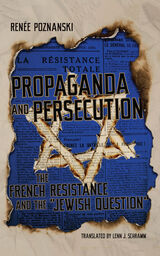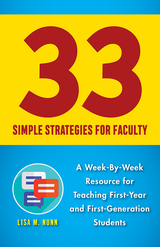
Many students struggle with the transition from high school to university life. This is especially true of first-generation college students, who are often unfamiliar with the norms and expectations of academia. College professors usually want to help, but many feel overwhelmed by the prospect of making extra time in their already hectic schedules to meet with these struggling students.
33 Simple Strategies for Faculty is a guidebook filled with practical solutions to this problem. It gives college faculty concrete exercises and tools they can use both inside and outside of the classroom to effectively bolster the academic success and wellbeing of their students. To devise these strategies, educational sociologist Lisa M. Nunn talked with a variety of first-year college students, learning what they find baffling and frustrating about their classes, as well as what they love about their professors’ teaching.
Combining student perspectives with the latest research on bridging the academic achievement gap, she shows how professors can make a difference by spending as little as fifteen minutes a week helping their students acculturate to college life. Whether you are a new faculty member or a tenured professor, you are sure to find 33 Simple Strategies for Faculty to be an invaluable resource.
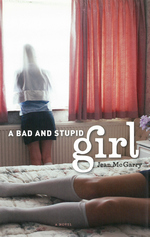
Brought together by chance, the girls soon become partners in a struggle to find their way in a world where neither Esther’s brains nor Siri’s beauty is enough. Never having been forced to work hard at anything, Siri must rely on Esther to teach her to learn and attend class. But as Siri wakes from her dream world to discover the life of the mind, Esther begins shedding her rational bonds to explore the mysteries of the soul. For both, some of the most devastating lessons in the attainment of worldly knowledge come from love.
Deadpan funny and bittersweet, A Bad and Stupid Girl is above all else a moving portrait of two friends helping each other to uncover the potential splendor of their lives.
“Jean McGarry's novel is a lovely locket of a book, with the picture inside not at all faded. Focused in close-up, succinct and convincing, it's a story about friendship and maturation, and about how our studies, alone, do not define us.”
—Ann Beattie
“Jean McGarry’s A Bad and Stupid Girl is an uncommonly Good and Bright-Indeed Novel, sharply written from start to finish and entertaining as Hell.”
—John Barth
“Everything in life is arbitrary yet must be over-determined in literature. Jean McGarry knows how to tell a persuasive tale illuminating these truths.”
—Harold Bloom
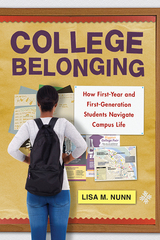
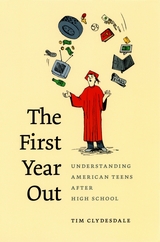
Wild parties, late nights, and lots of sex, drugs, and alcohol. Many assume these are the things that define an American teenager’s first year after high school. But the reality is really quite different. As Tim Clydesdale reports in The First Year Out, teenagers generally manage the increased responsibilities of everyday life immediately after graduation effectively. But, like many good things, this comes at a cost.
Tracking the daily lives of fifty young people making the transition to life after high school, Clydesdale reveals how teens settle into manageable patterns of substance use and sexual activity; how they meet the requirements of postsecondary education; and how they cope with new financial expectations. Most of them, we learn, handle the changes well because they make a priority of everyday life. But Clydesdale finds that teens also stow away their identities—religious, racial, political, or otherwise—during this period in exchange for acceptance into mainstream culture. This results in the absence of a long-range purpose for their lives and imposes limits on their desire to understand national politics and global issues, sometimes even affecting the ability to reconstruct their lives when tragedies occur.
The First Year Out is an invaluable resource for anyone caught up in the storm and stress of working with these young adults.

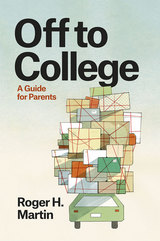
With Off to College, Roger H. Martin helps parents understand this important period of transition by providing the perfect tour of the first year on today’s campus. Martin, a twenty-year college president and former Harvard dean, spent a year visiting five very different colleges and universities across the United States—public and private, large and small, elite and non-elite—to get an insider’s view of modern college life. He observes an advising session as a student sorts out her schedule, unravels the mysteries of roommate assignments with a residence life director, and patrols campus with a safety officer on a rowdy Saturday night. He gets pointers in freshman English and tips on athletics and physical fitness from coaches. He talks with financial aid officers and health service providers. And he listens to the voices of the first–year students themselves. Martin packs Off to College with the insights and advice he gained and bolsters them with data from a wide variety of sources to deliver a unique and personal view of the current student experience.
The first year is not just the beginning of a student’s college education but also the first big step in becoming an adult. Off to College will help parents understand what to expect whether they’re new to the college experience or reconciling modern campus life with memories of their own college days.
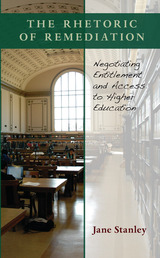
In The Rhetoric of Remediation, Jane Stanley examines the statements and actions made regarding remediation at the University of California, Berkeley (Cal). Since its inception in 1868, university rhetoric has served to negotiate the tensions between an ethic of access and the assertion of elite status. Great care has been taken to promote the politics of public accessibility, yet in its competition for standing among other institutions, Cal has been publicly critical of the “underpreparedness” of many entrants. Early on, Cal developed programs to teach “Subject A” (Composition) to the vast number of students who lacked basic writing skills.
Stanley documents the evolution of the university's “rhetoric of remediation” at key moments in its history, such as: the early years of “open gate” admissions; the economic panic of the late 1800s and its effect on enrollment; Depression-era battles over funding and the creation of a rival system of regional state colleges; the GI Bill and ensuing post-WWII glut in enrollments; the “Red Scare” and its attacks on faculty, administrators, and students; the Civil Rights Movement and the resultant changes to campus politics; sexist admission policies and a de facto male-quota system; accusations of racism in the instruction of Asian Americans during the 1970s; the effects of an increasing number of students, beginning in the 1980s, for whom English was a second language; and the recent development of the College Writing Program which combined freshmen composition with Subject A instruction, in an effort to remove the concept of remediation altogether.
Setting her discussion within the framework of American higher education, Stanley finds that the rhetorical phenomenon of “embrace-and-disgrace” is not unique to Cal, and her study encourages compositionists to evaluate their own institutional practices and rhetoric of remediation for the benefit of both students and educators.
READERS
Browse our collection.
PUBLISHERS
See BiblioVault's publisher services.
STUDENT SERVICES
Files for college accessibility offices.
UChicago Accessibility Resources
home | accessibility | search | about | contact us
BiblioVault ® 2001 - 2024
The University of Chicago Press



